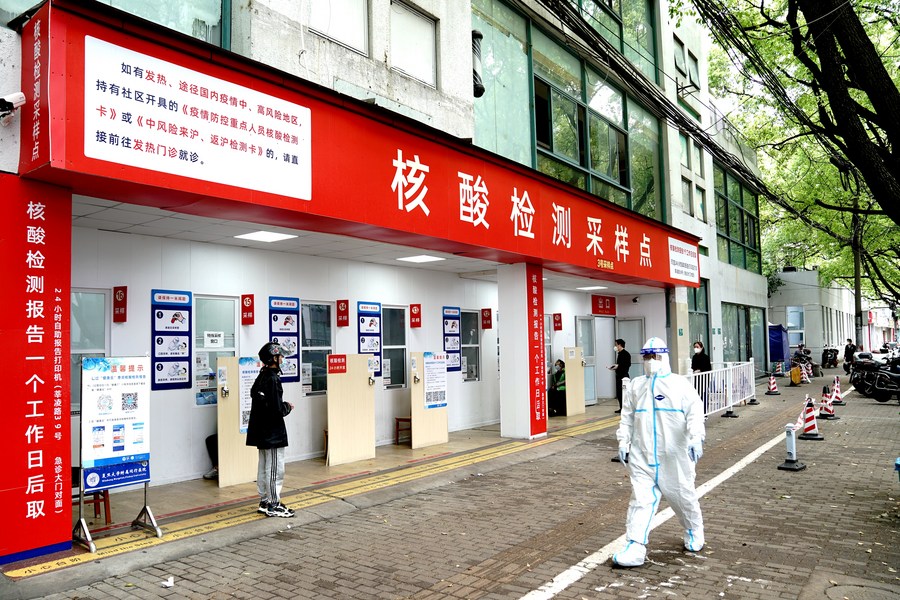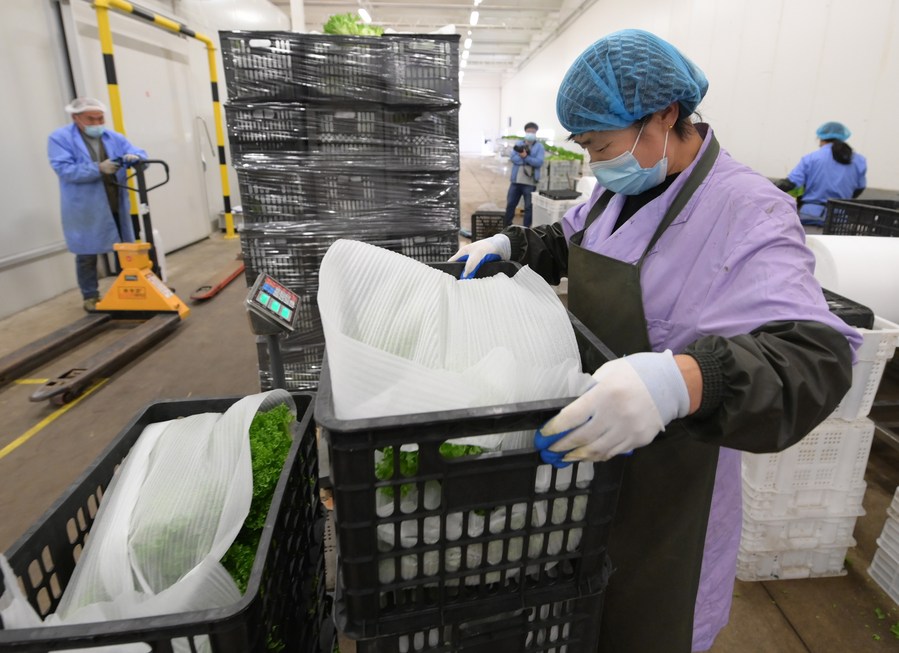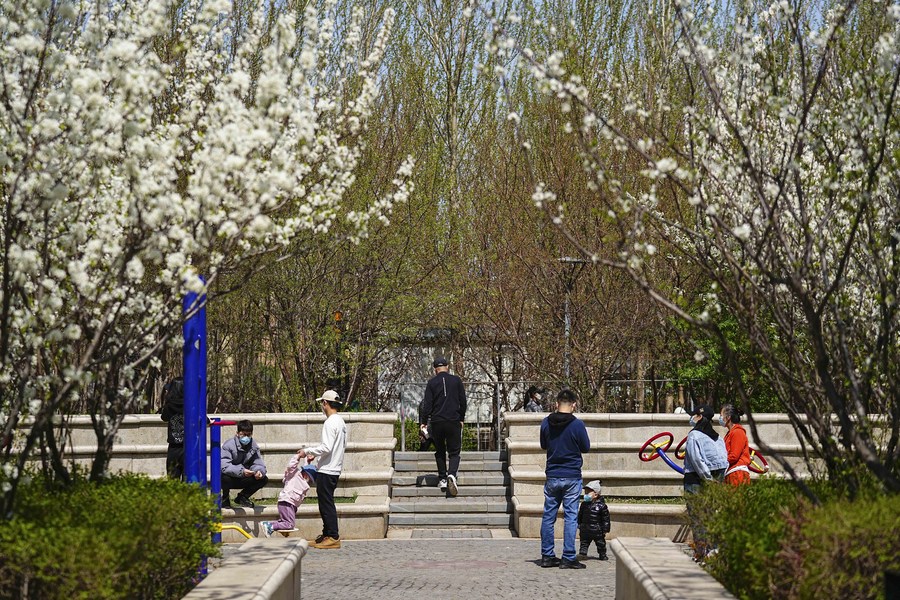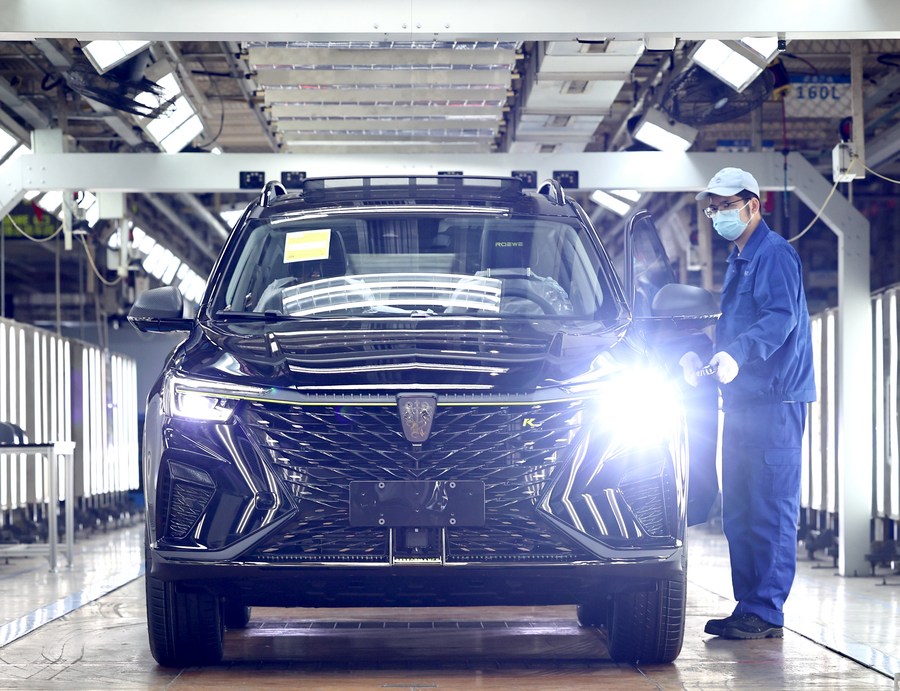China's resolute measures against Omicron pay dividends
* The Chinese mainland reported 1,494 locally transmitted confirmed COVID-19 cases on Wednesday, of which 1,292 were in Shanghai and 48 were in Beijing.
* Beijing is conducting three rounds of nucleic acid testing from Monday to Saturday. The first round has been completed, with over 19.8 million samples collected and 12 tubes showing positive results.
* Jilin Province, the northeastern manufacturing hub and national commodity grain base which has seen over 60,000 cases reported in the latest outbreak, will resume normal life and production in an orderly manner.
BEIJING, April 28 (Xinhua) -- Following the onslaught of Omicron in Shanghai and the northeastern province of Jilin, Beijing has moved ever faster to curb the spread of new clusters.
The Chinese mainland reported 1,494 locally transmitted confirmed COVID-19 cases on Wednesday, of which 1,292 were in Shanghai and 48 were in Beijing. A total of 2,724 COVID-19 patients were discharged from hospital after recovery on the same day, the National Health Commission said Thursday.
Sticking to its dynamic zero-COVID approach, China has been battling the virus with more resolute measures that have begun to pay dividends.

A medical worker takes a swab sample from a resident for nucleic acid test in Chaoyang District, Beijing, capital of China, April 25, 2022. (Xinhua/Ju Huanzong)
CUTTING OFF TRANSMISSION LINES
The latest COVID-19 resurgence in Beijing started on April 22, as new local confirmed cases were found in the districts of Chaoyang and Shunyi, with school students and tour groups involved.
Racing against time, the Chinese capital held a press conference overnight, mapped out the risk areas and put them under closed-loop management, in a bid to cut the transmission chains as soon as possible. There are currently five high-risk areas and 16 medium-risk areas in the city.
Beijing is also conducting three rounds of nucleic acid testing from Monday to Saturday. The first round has been completed, with over 19.8 million samples collected in five-in-one or 10-in-one tubes and 12 tubes showing positive results, said Li Ang, deputy director of the Beijing municipal health commission.
To stem infections in schools, major districts in Beijing have suspended in-person school classes of middle and primary schools and kindergartens and started online teaching.

Photo taken on April 27, 2022 shows a nucleic acid testing site in Minhang District, east China's Shanghai. (Xinhua/Zhang Jiansong)
Shanghai has also been adopting rigorous measures to curb the epidemic. It has divided the whole city into closed-off management areas, restrictive control areas, and prevention areas to mitigate and control the spread, with the former two zones under closed-loop management.
The Chinese economic hub reported 1,292 confirmed locally transmitted COVID-19 cases and 9,330 local asymptomatic carriers on Wednesday.
Now, Shanghai is speeding up the establishment of regular nucleic acid testing sites, so that residents have convenient access to testing.
Zhao Dandan, deputy director of the Shanghai municipal health commission, told a press conference Thursday that the city has been accelerating the vaccination of the elderly through measures including setting up temporary vaccination sites in nursing homes and arranging mobile vaccination vehicles in communities.

A citizen selects vegetables at a supermarket in Haidian District, Beijing, capital of China, April 26, 2022. (Xinhua/Ren Chao)
STABILIZING SUPPLY
Beijing's wholesale markets, supermarkets and online grocery platforms are going all out to maintain storage and increase supply.
The 4,800-square-meter Shuangjing branch of the Chinese retail chain Wumart Stores sits close to a high-risk area. "We have increased our supply four to fivefold and will replenish commodities in real time," said Song Feifei, general manager of the branch whose team has been working for days to ensure the supply for residents nearby.
Beijing's biggest wholesale market Xinfadi has boosted its daily supply of vegetables to more than 19,000 tonnes. "The market has mobilized merchants to increase storage and transportation of goods. The market's reserves are sufficient and the prices are stable," said Tong Wei, director of the marketing publicity department of Xinfadi.
Chinese online food delivery giant Meituan has expanded its frontline sorting personnel and delivery staff by 70 percent and 50 percent respectively, while fresh produce supermarket Hema Fresh has increased its delivery capacity by 30 percent and started contactless distribution services in some communities.

Staff members transport green onions at a distribution center of a supermarket in Beijing, capital of China, April 26, 2022. (Xinhua/Ren Chao)
Overall, the supply of various necessities in Beijing is sufficient and stable, said Zhao Weidong, deputy head of the municipal commerce bureau. "The trade of grain and edible oil products in Beijing is stable, with adequate reserves which can meet the consumption demand of residents in the city for 30 days."
In Shanghai, global logistics solutions provider GLP has been supporting the city's anti-epidemic battle by providing storage resources and donating urgently needed materials to help enterprises and communities guarantee supplies and protect people's livelihoods.

Employees pack vegetables to be sent to the urban areas at a planting base in Chongming District, east China's Shanghai, April 19, 2022. (Xinhua/Li He)
The company now serves 35 supply-related enterprises, with an average daily shipment of nearly 3,000 tonnes, including fresh food and medical materials.
RESUMING LIFE, PRODUCTION
The cities of Changchun and Jilin in Jilin Province began gradually easing their citywide closed-off management restrictions from Thursday.

Residents enjoy spring time at a residential area in Changchun, northeast China's Jilin Province, April 27, 2022. (Xinhua/Xu Chang)
On Thursday morning, residents in Changchun went outdoors to jog and walk along the Yitong River after days of home quarantine. Some went out to supermarkets to shop while wearing masks and maintaining social distance.
"We are going shopping to celebrate the return to normality," said Liu Cong, a Changchun resident.
As the transmission of COVID-19 has been effectively curbed, Jilin Province, the northeastern manufacturing hub and national commodity grain base which has seen over 60,000 cases reported in the latest outbreak, will resume normal life and production in an orderly manner.
In the cities of Changchun and Jilin, public transportation has resumed service, while supermarkets and wholesale markets selling agricultural products and daily necessities began to reopen on Thursday.

A worker works at an auto parts company in Jilin City, northeast China's Jilin Province, April 19, 2022. (Xinhua/Zhang Nan)
The 500 major enterprises in the province including leading Chinese automaker FAW Group Co., Ltd. have resumed work and production under daily COVID-19 prevention and control measures including nucleic acid testing and disinfection.
Fawer Automotive Parts Co., Ltd., auto parts supplier of automakers such as FAW Group and Great Wall Motors, said its daily output has exceeded more than 100 tonnes.

A worker works at the assembly workshop of automaker SAIC Motor Company's Lingang base in Shanghai, east China, April 23, 2022. (Xinhua/Chen Jianli)
In Shanghai, major companies and factories have been gradually resuming work and production. U.S. carmaker Tesla's Shanghai factory officially resumed production on April 19.
"We have full confidence in China's economy," said Tao Lin, vice president of Tesla. "From the process of the current production resumption, we have seen China's ability to cope with challenges, and we believe that normality will soon return."
Photos
Related Stories
- 2,724 COVID-19 patients discharged from hospitals on Chinese mainland
- Chinese mainland reports 1,494 new local COVID-19 cases, 1,292 in Shanghai
- China's Changchun to resume life, production as epidemic eases
- Beijing's Haidian District strengthens supply of daily necessities
- Daily supplies sufficient in Beijing amid COVID-19 resurgence
Copyright © 2022 People's Daily Online. All Rights Reserved.










